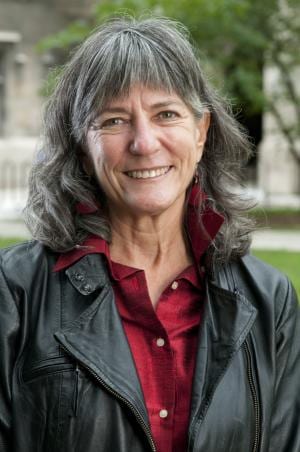Goldin-Meadow wins 2021 David E. Rumelhart Prize for her cognitive science research
The Beardsley Ruml Distinguished Service Professor is recognized for her work exploring the origins of language
By Sarah Steimer
Susan Goldin-Meadow, the Beardsley Ruml Distinguished Service Professor in the Department of Psychology and the Department of Comparative Human Development, was named the winner of the 2021 David E. Rumelhart Prize for her work in cognitive science, particularly her research on linguistically isolated deaf children.
The prize is awarded annually to an individual or team for their contributions to the theoretical foundations of human cognition and includes a monetary award of $100,000.
Goldin-Meadow’s work explores the origins of language through homesign systems, which are the communicative gestures developed spontaneously by profoundly deaf children who cannot learn speech and are not exposed to formal sign language. Her research illustrates how some of the building blocks of language come from individual human minds, versus cultural evolution.
The homesign research helps explain which parts of language are hard-wired and which are introduced by each generation of language-learners and language-users. The findings shed light on how researchers may better understand how people learn to communicate, and her work helps explain developmental phenomena and the human capacity for language.
“It was a tremendous honor to receive this award, and a validation of my work as central to cognitive science,” says Goldin-Meadow, who also serves as co-director of the Center for Gesture, Sign and Language. In receiving the award, Goldin-Meadow gave a keynote address at the 43rd annual meeting of the Cognitive Science Society in July, also known as CogSci, at which time she presented a paper and her students also discussed their collaborations with her in their own symposium. “My students gave a brilliant symposium, which I am very proud of,” she says.
Goldin-Meadow, who joined the University of Chicago faculty in 1976, became interested in psychology while an undergraduate at Smith College. She spent her junior year at the Institut des Sciences de l’Education in Geneva, which ignited her interest in the relationship between language and thought and in the creation of language. She received her doctorate in developmental psychology at the University of Pennsylvania.
Goldin-Meadow’s research explores the thoughts we have that are hidden in our hands, in hands that create language from scratch (as in homesign) or in hands that accompany language (as in the gestures we produce when we talk). In addition to the homesign work, which has led to insights into the thoughts we have that shape the structure of language, the work on co-speech gesture has revealed thoughts we have that are different from our thoughts encoded in speech. These gestures thus provide a different window onto our minds than speech gives us.
In the coming years, Goldin-Meadow says her work will include developing computational models that do — and don’t — take into account what we have learned about language-learning from homesign. Her team will apply the models to a large database of mother-child speech they’ve collected in order to predict the trajectory children actually follow as they learn language from their parents.
With respect to her work on co-speech gesture, Goldin-Meadow is working with Marc Berman, an associate professor of psychology and in the UChicago Neuroscience Institute, to understand the neurological basis of learning through gesture, using functional magnetic resonance imaging (fMRI) and functional near-infrared spectroscopy (fNIRS).
“I have been moving more and more in a cognitive science direction, collaborating with colleagues to develop computational models of language learning and to explore the neurobiological mechanisms that support gesture’s role in learning,” Goldin-Meadow says. “This award will help keep me focused on these goals.”
 THE UNIVERSITY OF CHICAGO
THE UNIVERSITY OF CHICAGO


